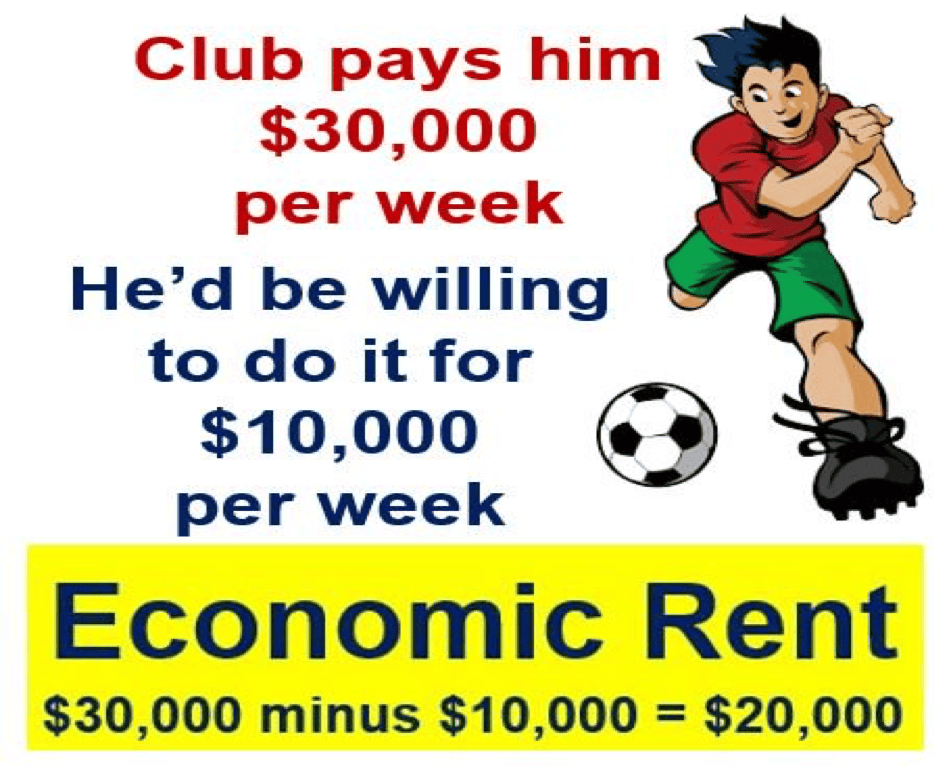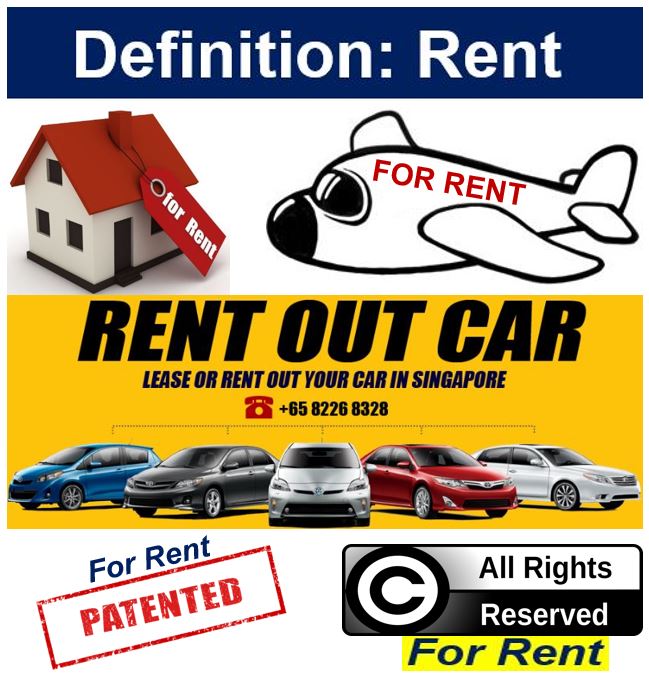Rent, in the world of economics, has two main meanings: 1. Income from hiring out land, property, vehicles or any other durable good. 2. The difference between what people are paying for a factor of production and the minimum required. Specifically, the minimum we need for it (or he/she) to remain in current use. We refer to this as ‘economic rent.’
Put simply; economic rent is any payment greater than the cost of production. For example, let’s suppose you paid a professional sportsman $30,000 weekly to play in your club. However, he would quite happily do it for just $8,000. His economic rent is therefore $22,000 per week.
In a perfect market, i.e., one with perfect competition – economic rents do not exist. They do not exist because new commercial enterprises enter the market, they compete until prices decline. Prices decline until all economic rents vanish.
The reduction of economic rents does not alter production decisions. Therefore, the government can tax them without adversely affecting the real economy.
Perfect Competition refers to a theoretical free-market Utopia. In this utopia, there are several sellers and buyers. None of them has any significant impact on the prices of goods. All buyers and sellers seek to maximize their income.
 Economic rent is the difference between what one pays for a factor of production and the minimum required for it continue working.
Economic rent is the difference between what one pays for a factor of production and the minimum required for it continue working.
Economic rent – another example
Economic rent is the income that can be earned from land or any natural resource for which the supply is fixed – supply is perfectly inelastic. As the supply is perfectly inelastic, how much of that supply there is does not depend on any income that the resource is able to produce.
Rising demand does not lead to an increase in the supply because it is a natural product that was always available.
What is land?
When humans first started populating the land, it was there for the taking – nobody made it, it was not the result of anybody’s efforts – it was a gift from nature. Hence, whatever rent or revenue that can be earned from the land is unearned by its owner.
 To ‘rent out’ something means to lend it to somebody, a company or any entity for a fee. If a friend asks you to lend him some money, and he offers to loan his car to you in return, he is offering to rent out his car to you. The word ‘rent’ (without ‘out’) on its own: 1. As a noun means the money the borrower pays (the tenant pays rent to the landlord). 2: As a verb means the action of borrowing temporarily and paying for it (I am renting a car from Hertz).
To ‘rent out’ something means to lend it to somebody, a company or any entity for a fee. If a friend asks you to lend him some money, and he offers to loan his car to you in return, he is offering to rent out his car to you. The word ‘rent’ (without ‘out’) on its own: 1. As a noun means the money the borrower pays (the tenant pays rent to the landlord). 2: As a verb means the action of borrowing temporarily and paying for it (I am renting a car from Hertz).
Two farmers
For example, imagine two farmers own two acres of land each. They both farm the land identically, with the same real capital.
Farmer Giles is able to produce 2 tons of wheat from those two acres. Farmer Jones, however, can only produce 1 ton of wheat.
The difference between farmers Giles’ and Jones’ output is due solely to the fact that Farmer Giles’ soil is more fertile.
If, in a free market economy, the price for 1 ton of wheat is $500, Farmer Giles earns $1,000 while Farmer Jones earns $500. The difference in land quality for wheat production is the sole reason for the $500 gap between the two farmers.
They both used identical agricultural methods, i.e., Farmer Giles did nothing to earn those extra $500 – it was a free gift from nature. Therefore, we class the $500 as economic rent that Farmer Giles earned in excess of what Farmer Jones received.
Farmer Jones has also earned some economic rent because without land he would have had no wheat. However, we cannot determine the economic rent without a reference, because even though he earned $500, a proportion of that money came from his efforts (labor) and whatever he spent on agricultural tools and machinery (capital).
What is rent-seeking
In public-choice theory and economics, rent-seeking refers to trying to increase one’s share of existing current wealth without creating any new wealth.
If you use the resources of an individual, company or any organization to obtain economic gain from others – to make yourself richer – but do not reciprocate any benefits to society through wealth creation, you are rent-seeking.
When a company lobbies the government for grants, tariff protection, or loan subsidies, it is rent-seeking. None of these things create any benefit for society. The company does not create any extra wealth. It becomes richer, but the taxpayer has to pay for it.
If you are CEO of a company and you succeed in obtaining subsidies or getting legislation passed that restricts competition and makes it harder for newcomers to enter the market – barriers to entry – you have managed to increase your share of existing wealth without increasing the size of that total wealth; you have been rent-seeking.
Moreover, you have earned income without actually creating or producing anything at all. You have not put any of your capital at risk either.
Closed-shop systems
In any environment where a closed-shop system exists, so does rent-seeking. There are cases when requiring a license makes sense. Doctors and airline pilots, for example, should not practice without their licenses for obvious reasons.
However, what if you want to work as a florist, packer, taxi driver, or docker? What if you need an onerous license then? The license in such cases is a giant barrier to entry. It is not protecting passengers or patients, etc.
Licensing requirements and other barriers to entry exist as a result of lobbying efforts. Specifically, lobbying efforts from people who work certain industries.
The wealth pie does not grow
What happens if fewer players can operate within an industry? It means that each participant gets a larger slice of the wealth pie. Licensing requirements contribute nothing to the creating of additional wealth. In other words, they do not make that wealth pie any larger.
Any closed-shop system is bad for consumers. Free competition drives down prices. Lack of competition and rent-seeking behaviors, however, keep prices high.
Government corruption and rent-seeking
Corruption among politicians and civil servants is also within the concept of rent-seeking.
Bribe-seeking bureaucrats are guilty of rent-seeking. They are getting richer without creating any additional wealth.
Regulatory Capture refers to a regulatory agency that was initially set up to police an industry and protect the consumer but ends up working for the industry to the detriment of the consumer.
Regulatory capture is a bit like setting up a group to protect the sheep from the wolves, and eventually recruiting wolves into the group, and placing the rights of wolves above those of the sheep. We see it as enabling extensive rent-seeking behavior.
It is uncommon to use ‘to hire’ for things that cannot be transported, such as a house, apartment or land. ‘To rent’ is commonly used for both transportable and non-transportable goods.
